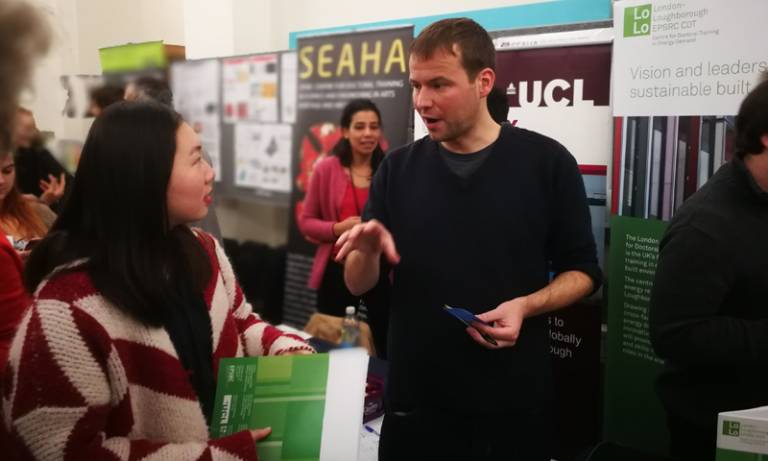Open Day stimulates new questions
14 December 2017
Duncan Grassie reflects on research motivations, at the recent UCL Graduate Open Day

What motivates someone to sign up for a Masters or PhD? I was struck by this question as I chatted with prospective students at the recent UCL Postgraduate Open day, on 6th December 2017. In my own case the answers have been very different depending on when the question was asked. For my original Masters in Petroleum Engineering a decade ago, the Masters was a sponsored route into an industry which provided most of the engineering jobs in my area. However, for my current PhD at the UCL Energy Institute, the motivation was based on my first-hand experience of depleting oil fields and a realisation that Energy Demand would be a critical field of the next few decades.
So it was interesting to meet a few prospective students – investigating options for Masters and PhDs – who I’d say fall into two main categories. Many, like myself, were coming into the field from other disciplines such as Computer Science, Engineering or Economics, and recognised that the development of smart meters, changes from gas to electrical networks and battery storage systems made this a young and developing field to be involved in currently. Others with experience in construction and civil engineering were actually investigating turning their own personal interests at work into academic projects.
It was encouraging to see lots of different age groups approaching the LoLo desk at the fair. I think that for mid-career changers like myself, there is always time to learn about a new field of interest and for students more informed in a field, a Masters degree should be formed from one’s own intuition and interests, having formed an opinion on the basics of a topic rather than just the inevitable next step.
Having been at UCL for one and a bit years now (first as an MRes student, and now as a doctoral student) I think what stands out about this university is just how many different types of student are crammed into such a small space as a result of UCL’s unique location. Despite this, it is often too easy to get wrapped up in your own department. I think the one thing I would take away from this Postgraduate fair for my own development is to make sure during my time here I find out more about the work of groups like CASA (Centre for Advances Spatial Analysis) which are on the periphery of my own project but could provide a new direction for my work. When working towards a PhD the temptation is often to dig your head into a hole for three years in order to complete it in time, but actually it is just as important to be hearing about what other groups are doing – and even prospective students are proposing and making contacts for the future.
Duncan Grassie is in the first year of his PhD within the London-Loughborough EPSRC Centre for Doctoral Training in Energy Demand (LoLo CDT), investigating feedback mechanisms to gather schedules, controls and setpoints for heating, electrical and lighting systems directly from school building occupants to be incorporated into a stock model of more than 20,000 schools across England and Wales.
 Close
Close

